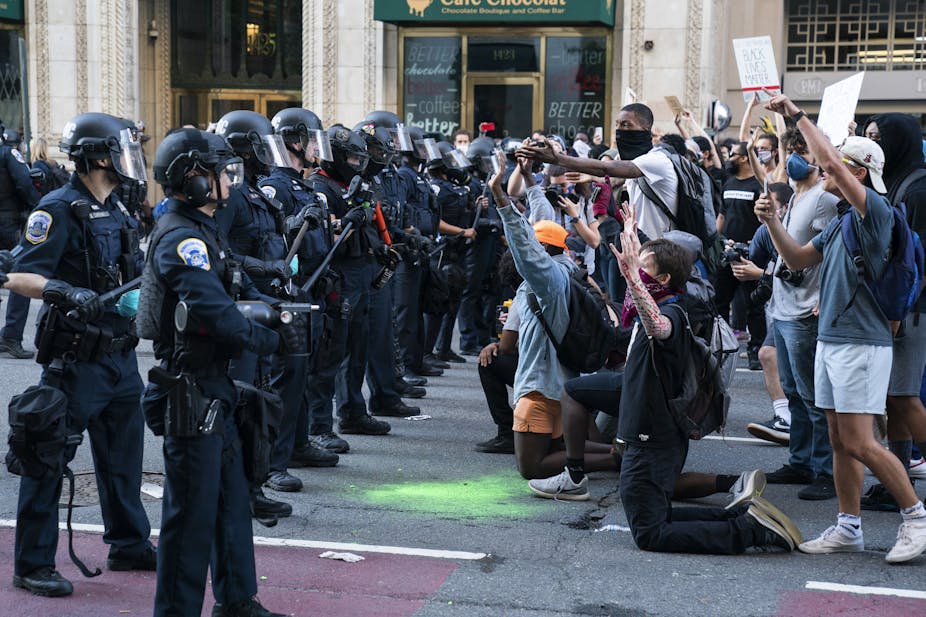Protests following the police killing of George Floyd have continued for over a month in the United States and around the world. But the American public was once again shocked by the murder of another African-American man Rayshard Brooks in an arrest, leading to a renewed wave of protests.
The domestic racial unrest in the US - the oldest continuous democracy in the world and a self-perceived global leader - has drawn accusations of hypocrisy.
Many governments and citizens of the world, including those in Indo-Pacific, are questioning how democratic the US really is.
However, inspirational activism by American citizens may offer a silver lining.
Read more: How to communicate COVID-19 risk without fuelling anti-Chinese sentiment in Indonesia
Spotlight on US hypocrisy
Police brutality against people of colour in the US and the way President Donald Trump has responded to ensuing protests present a new chapter in a history of American human rights violations.
China, often scrutinised by the US for racial and religious discrimination and suppression of political activists, was quick to call the US a hypocrite.
While many Indo-Pacific governments are silent on the US domestic situation, the racial problems in the US serve as a reminder that while it prides itself on being a bellweather of freedom, the country tends to say one thing but do another.
The Trump administration initially refused to promote moral values internationally, but he cannot easily divorce himself from US’ global role as the defender of human rights and democracy.
For example, in November last year, Trump signed a bill banning the export of crowd-control munitions to the Hong Kong police. It was an attempt to compel China and Hong Kong to pursue negotiation following the massive anti-government protests.
But the bill contrasts with US’ excessive force against African-Americans and protesters, and Trump’s aggressive language on Twitter.
Read more: Let's talk more about racism in Indonesia
Questions on US democratic legitimacy
The death of African-Americans at the hands of US police, the ensuing protests, and the government’s response can be seen to weaken US legitimacy as the champion of human rights and democracy.
The US government has continued seeking to lead the world, including in the Indo-Pacific region. In promoting democracy, the US needs international support more than any other democracies.
In November last year, the US government issued a document called “A Free and Open Indo-Pacific”, in which Washington detailed steps that it has taken to ensure the Indo-Pacific region continues to remain peaceful, prosperous, and secure.
One of the key points in the document deals with the US’ commitment to punish countries for mistreating their citizens.
Even before George Floyd’s death, the US’ international image on respecting American human rights had suffered in several Asia-Pacific countries from 2013 to 2018, prompted by the US massive government surveillance programmes that violate the right to privacy.
Among allies in Asia, views of the US trended slightly downward since Trump became president.
The ongoing racial turmoil will only make it harder for US diplomats to spread the message of democracy and human rights.
In Indonesia, one of the larger countries in the Indo-Pacific and the third-largest democracy, citizens are questioning US democracy.
Said Aqil Siradj, the head of country’s and the world’s largest Islamic organisation Nahdlatul Ulama, has pointed out that US democracy and its human rights system has been in crisis.
Police abuse of African-Americans is a manifestation of the crisis, and US-style democracy cannot be the world’s standard, Siradj has said.
Inspiring activism
What the US may lose through its handling of the domestic turmoil, can be earned back by its citizens’ anti-racist activism, which has resonated all over the globe.
Americans have expressed their response to legal injustices against minorities and the recent killings of several African-Americans through multiple avenues, including social media.
Their expressions are as diverse, and may be guided by their levels of concern with public issues, amount of time and money, and political skills such as lobbying and fundraising.
American political participation off the street - which is often lost in media reporting, particularly outside the US - cannot be ignored.
Those who have less time or unwilling to risk their health amid the pandemic by joining a street protest but have financial resources have chosen to participate by making donations to bail funds for those jailed during the demonstrations, or to Democratic candidates and causes.
Huge corporations, such as major record labels who have benefited from black artists, took a pause and have made their stance public.
Businesses such as Walmart and Johnson & Johnson have also opted for business practices in favour of diversity.
American citizens from different races, ages, and economic backgrounds, pose a reminder to the world’s authoritarian and democratic regimes of what can be done by those who are committed to democracy and human rights values and practices.
Their fight against bigotry has become a source of inspiration for citizens of Indo-Pacific countries, such as Indonesia, India, Singapore, the Philippines, South Korea, and Japan who are fighting against discrimination and intimidation at home.
Racial problems in Asian countries ranges from an obsession with fair skin in India and micro-aggression in Singapore, to the absence of anti-racial discrimination law in a homogeneous country with an increasing vibrant migrant workers community and multicultural families like South Korea.
In Indonesia, #BlackLivesMatter gave a bigger push to discussions on racial discrimination and violence against Papuans.
In its own way, America’s citizen activism can help the US maintain its international legitimacy in human rights and democracy.


